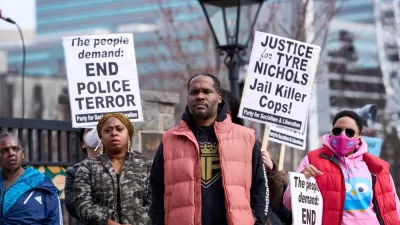A natural experiment in Medellín indicates that infrastructural investments can reduce crime and improve perceptions of public safety.

Writing in Streetsblog Chicago, Courtney Cobbs describes a 2012 analysis of how the built environment can affect violence and societal trust in Medellín, Colombia, and the lessons it provides for U.S. cities like Chicago. The study compared two neighborhoods, one that received infrastructure improvements and one that did not, to see how those improvements affected crime rates and community trust.
As part of the city's development plan, Medellín installed a network of gondolas known as Metrocable, which shuttle residents up and down the city's steep hillsides. In neighborhoods served by Metrocable, the government also installed "additional lighting for public spaces; new pedestrian bridges and street paths; 'library parks' (combining a library building and parkland); new buildings for schools, recreational centers, and centers to promote microenterprises; more police patrols; and a family police station (focusing on the protection of women and children) next to a gondola station." In other words, the gondola was accompanied by a system of public amenities, supportive infrastructure, and social services.
In the research period of 2003 to 2012, homicide rates and perceived violence dropped in all of Medellín's neighborhoods, but dropped more sharply in the neighborhoods with the gondola and new amenities. According to Cobbs, "Belief that residents could have a positive impact on reducing crime, and look out for one another in their neighborhood, increased in the intervention group but stayed stable for the control group."
The results indicate that "people-centered" infrastructure investments, while not a silver bullet, can have an impact on public safety and social cohesion, and Cobbs calls for similar investments in Chicago's underserved South and West sides.
FULL STORY: Notes from Medellín: Can infrastructure investments help reduce interpersonal violence?

Planetizen Federal Action Tracker
A weekly monitor of how Trump’s orders and actions are impacting planners and planning in America.

Maui's Vacation Rental Debate Turns Ugly
Verbal attacks, misinformation campaigns and fistfights plague a high-stakes debate to convert thousands of vacation rentals into long-term housing.

San Francisco Suspends Traffic Calming Amidst Record Deaths
Citing “a challenging fiscal landscape,” the city will cease the program on the heels of 42 traffic deaths, including 24 pedestrians.

Defunct Pittsburgh Power Plant to Become Residential Tower
A decommissioned steam heat plant will be redeveloped into almost 100 affordable housing units.

Trump Prompts Restructuring of Transportation Research Board in “Unprecedented Overreach”
The TRB has eliminated more than half of its committees including those focused on climate, equity, and cities.

Amtrak Rolls Out New Orleans to Alabama “Mardi Gras” Train
The new service will operate morning and evening departures between Mobile and New Orleans.
Urban Design for Planners 1: Software Tools
This six-course series explores essential urban design concepts using open source software and equips planners with the tools they need to participate fully in the urban design process.
Planning for Universal Design
Learn the tools for implementing Universal Design in planning regulations.
Heyer Gruel & Associates PA
JM Goldson LLC
Custer County Colorado
City of Camden Redevelopment Agency
City of Astoria
Transportation Research & Education Center (TREC) at Portland State University
Jefferson Parish Government
Camden Redevelopment Agency
City of Claremont




























